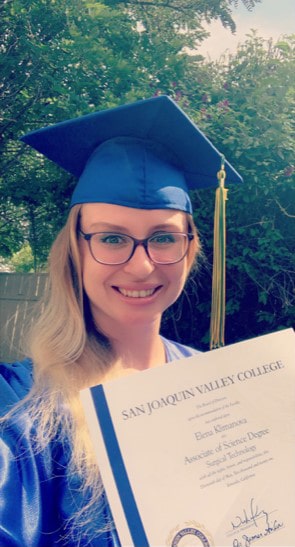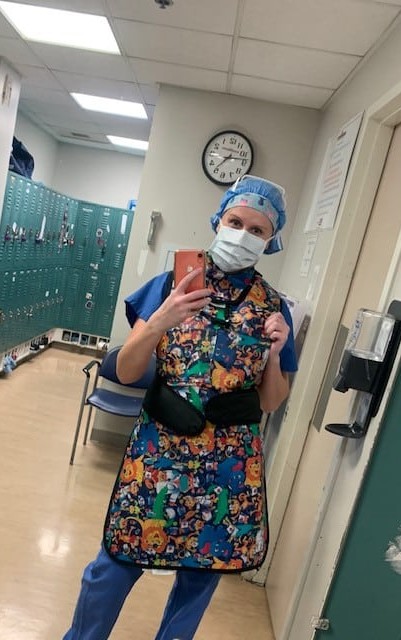Grad Q&A with Surgical Technology graduate Elena Klimanova
 It was a significant move for Elena Klimanova, who had already invested years of education and service in the business world of high finance and investment projections. But she finally admitted to herself that her heart had never been in it. She realized that success in something you didn’t love would always feel shallow, never enough. Time for change.
It was a significant move for Elena Klimanova, who had already invested years of education and service in the business world of high finance and investment projections. But she finally admitted to herself that her heart had never been in it. She realized that success in something you didn’t love would always feel shallow, never enough. Time for change.
Elena decided to layer another big move onto the one she and husband, Andrei, and their children Viktoriia and Egor (now 16 and 10 years old) had just made in 2016 to immigrate from Russia to the United States. With her family’s encouragement, she would go back to school for a career in the medical community. That is the career path that spoke to her heart and ignited her enthusiasm.
But…where to start? Which part of medicine should she choose? How could she get proper training? Can she really do this – especially since English was not her first language. Elena took a deep breath…and the first step.
What gave you the courage to begin this long and difficult move from a business career to one in the medical community?
When I was in my early twenties (in Russia) I volunteered at a hospital once a week for a few hours giving encouragement to mostly children who were dying of cancer. I wanted to spend more time and give real (medical) help. I felt I could do more. That’s how I found myself now.
I think this (interest) was in me all of my life and maybe I was just afraid to go to medical school (or program) and a private school.
How would your work in the business world compare with a position in the medical field?
I worked with a government agency, kind of like the IRS here in the States. I worked with numbers and money and was part of the economic faculty. But a good friend in Russia is an ER (Emergency Room) doctor and her stories were exciting for me. How great would it be to help someone and not just filling out all these papers every day!
How did you choose a specific medical position and education program?
Medical education in Russia is very different from medical education in the U.S., so I didn’t really know which direction to go. I decided to start at the beginning of a medical career, so I chose the CMA (Clinical Medical Assisting) program at SJVC. I got my certification. But when I finished, I realized I could do more.
What was the next level of advancement?
I wanted to work on the front lines in critical care, but becoming a Medical Doctor takes too long. I thought about operating and surgeries. Who do we have in the surgery rooms: doctors, nurses, anesthesiologists and a Surgical Technologist. I can be right there and useful to them all, setting up the ORs (Operating Rooms) and handing the surgeon appropriate instruments, working with my hands. That’s exactly what I want!
I knew that a Surgical Technology program had just opened at SJVC (Temecula campus). With my good experience with them earlier (with the Clinical Medical Assisting program), I decided to choose this college again.
 What was the Surgical Technology program like for you?
What was the Surgical Technology program like for you?
I would say that every single day was a special moment for me. We had a lot going on there. It’s like a whole life. I tried to help other students, give advice, which mistakes I made that I don’t want them to make the same ones. We checked each other on what we needed to open up for our case, how to set up instruments. But at the same time, we had fun.
I liked the different topics and procedures and I wanted to figure out how we are going to do this. I struggled with my English, but my instructor always told me, ‘You’re smart, just take your time’. I got a B and an A in my English classes.
What inspired you to keep pushing yourself?
I wanted to help the community and I wanted my family to be proud of me. That’s what families are best at doing – supporting each other’s dreams.
Did you get the support you needed when you needed it?
Everyone at SJVC helped me and supported me. The faculty was also very supportive when we had practice in our labs for mock surgeries. We had all the required instruments that we needed to accurately simulate the procedures. They gave me advice on how you can move faster. I had a lot of need, and I had a lot of support at school.
How did your Surgical Technology program schedule work with your home life?
My husband works from home, so he helped drive the kids to school and getting groceries. I went to bed at 3:00 AM and went to school at 7:00 AM. I was literally sleeping all the time I was at home, when I wasn’t reading, learning, making presentations. The first 8-weeks was a lot of information, and I didn’t hang out with friends or family. My workspace was the kitchen island. But we could hug anytime!
What advice would you give to someone who is afraid they might fail in a program this intense?
You cannot know everything. Don’t be afraid. Ask for help! Your classmates, instructors, professors – everyone. If someone is too busy, ask someone else. You will find the right person who is ready to help you.
 Now that you’re working as a Surgical Technologist, were you right about this career choice?
Now that you’re working as a Surgical Technologist, were you right about this career choice?
I think I’m in the right place, at the right time. I am a Surgical Tech Level II, and my hire date is July 2021. When I completed my externship (there), they offered me the position. That was, like, amazing! I was happy because I liked the people, I liked this hospital and I wanted to stay there.
Each day they put us in different rooms, with different doctors, nurses and specialties so we can work with ortho, robotics, trauma, general surgeries and many other specialties. I can do everything. That’s why I want to stay here for the rest of my life – or a very long time.
What are some of your responsibilities as a Surg Tech?
I prepare operating rooms and equipment and set up the surgery table. I help the nurse to prepare patients for surgery and I assist the surgeon during the different procedures. You need to know the right instrument when the surgeon asks for it. A blood vessel can rupture and cause excessive bleeding, so you need to anticipate how the surgeon will stop the bleeding and know every possible step. It’s exciting and I really love what I’m doing.
Is this a good career for just about anyone?
You really have to love this. I don’t think this kind of job is about money, although, yeah, you can make a lot of money. But, if you want to help someone, you can do this.
As a Surg Tech I don’t need to choose a specialty. I can do something different every other day. That’s what is really amazing. It holds my interest better.
What advice would you give to someone who is interested in becoming a Surgical Tech?
It is always changing, growing. I’m looking at coworkers that have been here for ten years. They are so professional, they can do everything, but they are still learning. That’s a very big deal. There’s different technology, instruments, procedures; we are learning every day.
Most important…follow your heart.
Read Our Career Guide On Surgical Technology In California
Surgical technologists, also known as operating room technicians, have a huge role in the preparation for operations. They set up operating rooms, arrange equipment and help doctors during surgeries.
You might also like
More stories about
Request Information
All fields using an asterik (*) are required.


